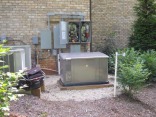
ncgenerators.com
Generator Inspections!
We leave nothing to chance!
Generators should be installed as if they will always encounter worse case scenarios. Systems installed without this philosophy will generally fail when you need them the most. There is a difference between a generator running the weekly run period and a generator actually providing the electrical source for your home or business during an extended utility outage event.
All manufacturers recommend a complete inspection of generating power systems before they are put into service. As a consumer you should require a comprehensive start up, including load testing with an external load bank, before the generator source is connected to your home or business. To do it any other way would be taking a risk that could ultimately cost you more than the worth of the generator!
We can perform the following services during an inspection of your generator system:
- Load Analysis in order to make sure your system is large enough for the electrical loads which will be provided generator power during a utility outage event.
- Electrical System Inspection in order to make sure there are no hazards, generally found in the way of objectionable current paths.
- Fuel Source Plumbing Inspection in order to make sure correct volume and pressure of gas afforded generator is sufficient.
- Generator Site Inspection in order to make sure there are no environmental or ventilation conditions present which could cause problems for the system in respect to correct and efficient operation as well as unit longevity.
Load Testing utilizing external load bank in order to monitor and or calibrate the following:
- Voltage stability and levels at different load stages
- Hertz stability and levels at different load stages
- Transient voltages
- Gas pressure at different load stages
- Rotor amp draw
- Excitation current level when fully loaded
- Temperature levels at different locations of the generator
- Operational Testing in order to make sure system functions as it should during a utility outage event.
Although residential and small commercial generators have been available for years, there is still a lot of bad representation by companies and a misconception by the consumer. A generator is not something you can simply start up and run and just because the engine starts, think that the generator is as it should be. There are several components of a generator, the engine, battery, and starter motor are only 3 of those components. To provide analysis of a system, a company would need to look at everything in order to provide an accurate picture and condition of the complete generator system.


